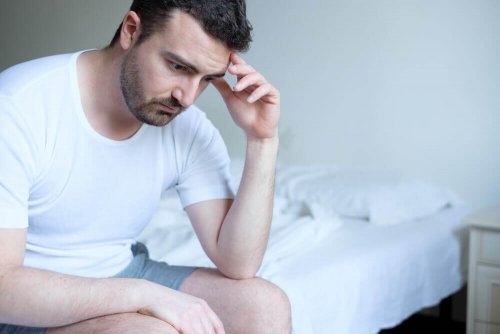Hypoactive Sexual Desire Disorder in Men

Hypoactive sexual desire disorder in men means that the affected individual no longer has sexual desires.
In situations that would’ve previously raised his libido, the male hardly experiences arousal. The problem becomes clear when difficulties occur repeatedly and whether or not he’s in a relationship.
In this article, we’ll tell you about some of the physical and psychological factors that occur in these cases. Of course, you should consult a professional if the symptoms persist.
Concept and classification of hypoactive sexual desire disorder in men
As we’ve pointed out, this alteration is based on a decrease or even absolute loss of libido in a man. In this scenario, hypoactive sexual desire occurs in one of two classes:
- Primary. In this case, the man doesn’t feel any sexual desire in relation to his partner. On the other hand, he may feel attracted to other men or women.
- Secondary. The man doesn’t feel any kind of sexual desire with any person, not with their partner or anyone else.

Regarding the progression of the disorder, it could be a specific event, if the male has had a normalized sexual desire earlier in his life, or as a chronic condition if he’s never felt arousal.
What causes hypoactive sexual desire disorder in men?
Several causes can lead to hypoactive sexual desire in men. As a review by researchers Eric J. H. Meuleman and Jacques J. D. M. Van Lankveld indicate, the most common ones are:
- Stress and anxiety
- Taking drugs, such as antidepressants
- Endocrine system disorders
- Hormonal deficiencies
- Routines in a relationship
However, given the variety of these conditions and the common coexistence between them, it’s often difficult to separate those whose origin is rather organic from those that mainly represent psychosocial aspects.
To the extent that it’s possible to identify the different factors involved, the way to tackle the problem will also be more precise. Here’s a closer look at these categories:
This article may interest you: 9 Factors that Can Decrease Sexual Desire
1. Physical causes
Certain chronic diseases, such as kidney, liver, heart failure, or diabetes are possible physical causes.

Likewise, a certain change in hormone levels that start during andropause can cause it. This is the time when testosterone, the male sex hormone related to desire, decreases with age.
It should be mentioned that the long-term use of alcohol, tobacco, or medication can also cause hypo-active sexual desire disorder in men.
2. Psycho-social causes
As an article by Canadian psychologist Lori A. Brotto states, stress is often present in men who suffer from hypoactive sexual desire disorder.
This is one of the most important factors, followed by the problems that directly affect the relationship, if the man is in one.
In this sense, deficits in communication, loss of trust in the partner or the sentimental partner, or other conflicts within the couple are usually the main reasons.
Other psychosocial causes that increase the chances of the disorder are having experienced traumatic experiences. This includes excessive sexual repression during childhood or suffering from sexual abuse.
Likewise, men may have experienced problems related to sex, such as premature ejaculation or the inability to maintain an erection. As a result, these problems cause feelings of frustration and can cause the disorder.
Check out this article: Seven Common Sex Mistakes Men Make
How to address this disorder
As you can see, hypoactive sexual desire has many diverse causes. For this reason, and if the alteration is persistent, it’s important to seek professional help.
Depending on the conditions that are being explored, each specialist, be it a doctor, sexologist, or psychologist, will give you the appropriate guidelines to start a treatment adjusted to your circumstances.
It can be treated, but for this it’ll be essential to recognize the problem and request the necessary advice to face the situation.
All cited sources were thoroughly reviewed by our team to ensure their quality, reliability, currency, and validity. The bibliography of this article was considered reliable and of academic or scientific accuracy.
- Brotto, L. A. (2010). The DSM Diagnostic Criteria for Hypoactive Sexual Desire Disorder in Men. The Journal of Sexual Medicine, 7(6), 2015–2030. https://doi.org/10.1111/j.1743-6109.2010.01860.x
- Brotto, L. A., Knudson, G., Inskip, J., Rhodes, K., & Erskine, Y. (2008). Asexuality: A Mixed-Methods Approach. Archives of Sexual Behavior, 39(3), 599–618. https://doi.org/10.1007/s10508-008-9434-x
- Meuleman, E. J. H., & van Lankveld, J. J. D. M. (2005). Hypoactive sexual desire disorder: an underestimated condition in men. BJU International, 95(3), 291–296. https://doi.org/10.1111/j.1464-410x.2005.05285.x
This text is provided for informational purposes only and does not replace consultation with a professional. If in doubt, consult your specialist.








